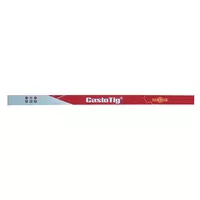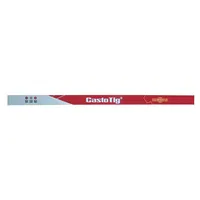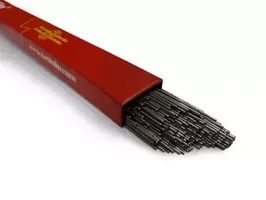- All products
- Unalloyed and low-alloyed
- Highly alloyed
- Cast iron
- Wear resistant
- Nickel
- Aluminum
- Copper
- Titan / Magnesium
- Cobalt

CastoWig 45500 WS TIG welding rod
312,07 £ 62,41 £ / kgfor stainless steels

CastoWig 45301 W
103,19 £ 103,19 £ / kgTIG welding rod for heat-resistant su...

CastoWig 45303 W TIG welding rod
175,46 £ 175,46 £ / kgfor cutting applications

CastoWig 45503 WS Austenitic weld metal
237,79 £ 47,56 £ / kgfor stainless steels

CastoWig 45507 WS TIG welding rod
759,55 £ 151,91 £ / kgfor difficult-to-weld steels

CastoWig 45513 WS
299,98 £ 60,00 £ / kgTIG welding rod for heat-resistant st...

CastoWig 45352 W TIG welding rod
146,24 £ 29,25 £ / kgTIG welding rod for tough hardfacings

CastoTig 45353 W Filler alloy rod for TIG welding
390,49 £ 78,10 £ / kgfor joining similar base metals

CastoTig 45552 WS
259,48 £ 51,90 £ / kgTIG welding rod for stainless steels

CastoWig 45553 WS TIG welding rod
327,13 £ 65,43 £ / kgfor stainless steels

CastoWig 45803 W Aluminum TIG welding rod
128,52 £ 25,70 £ / kgRod for aluminum and aluminum alloys

ToolTec 54023 DW Filling rod
111,86 £ 111,86 £ / kgfor non-alloy cast iron welds

CastoWig 45802 W TIG welding rod
184,64 £ 36,93 £ / kgfor aluminum-magnesium alloys

CastoWig 45355 W TIG welding rod
201,33 £ 201,33 £ / kgfor armor that can be machined

CastoWig 45252 W TIG welding rod
161,56 £ 32,31 £ / kgfor high-temperature CrMo steels

CastoWig 45701 W TIG welding rod
344,18 £ 68,84 £ / kgfor copper-nickel alloys

CastoWig 45703 W TIG welding rod
405,42 £ 81,08 £ / kgfor copper-tin alloys

CastoWig 45704 W TIG welding rod
472,11 £ 94,42 £ / kgfor copper materials

CastoWig 45706 W TIG welding rod
491,30 £ 98,26 £ / kgfor copper materials

CastoWig 45612 W TIG welding rod
948,38 £ 189,68 £ / kgfor corrosion-resistant connections /...

CastoTig 45554 WS
175,35 £ 35,07 £ / kgTIG welding rod for corrosion-resista...

CastoTig 45654 W
886,42 £ 177,28 £ / kgTIG welding rod for nickel alloys and...

CastoTig 45656 W
734,55 £ 146,91 £ / kgTIG welding rod for nickel and iron m...

CastoTig 45660 W
377,75 £ 75,55 £ / kgTIG welding rod for nickel, copper an...

CastoTig 45859 W
363,22 £ 363,22 £ / kgTIG welding rod for magnesium and mag...

CastoTig 45860 W
231,89 £ 231,89 £ / kgTIG welding rod for titanium and tita...

CastoTig 45751 W
266,51 £ 53,30 £ / kgTIG welding rod for copper-aluminum a...

CastoTig 45401 W
1.476,25 £ 295,25 £ / kgCobalt hard alloy for wear protection

CastoTig 45406 W
1.244,61 £ 248,92 £ / kgCobalt hard alloy for wear protection

CastoTig 45412 W
1.246,45 £ 249,29 £ / kgCobalt hard alloy for wear protection

CastoTig 45421 W
1.604,64 £ 320,93 £ / kgCobalt hard alloy for wear protection

CastoWig 45806 W
117,52 £ 23,50 £ / kgTIG welding rod for aluminum-magnesiu...
TIG welding process
In the TIG process, the arc is ignited under an argon or helium shielding gas atmosphere between a pointed tungsten electrode and the workpiece. The intense arc is particularly suitable for high-quality and precise welding work. As the tungsten electrode does not burn off during welding, only the base material is melted by the heat of the arc. The separate filler metal can be fed into the welding process manually or automatically.
With CastoTIG, Castolin Eutectic has developed a selection of special build-up alloys for industrial wear protection, repair and joining applications, which is complemented by a complete, high-quality CastoTig welding equipment range based on the latest technologies.
What is TIG welding?
TIG stands for tungsten inert gas welding. It uses a tungsten electrode and inert gas.
This technique is ideal for welding thin and reactive metals such as aluminum, magnesium, stainless steel, titanium and zirconium.
Tungsten inert gas welding, or TIG for short, is a variant of arc welding. A durable tungsten electrode and shielding gases are used to produce a high-quality welded joint.
The inert gas protects the weld seam from oxidation and contamination, resulting in high-quality weld seams.
TIG welding is often used to weld thin metals such as aluminum, magnesium and stainless steel. It is also a good choice for welding reactive metals such as titanium and zirconium.
How TIG welding works
In TIG welding, an electric arc is created between the tungsten electrode and the workpiece. The arc melts the workpiece and the filler material (if used). The shielding gas shield prevents the molten metal from oxidizing. The welder then moves the torch along the joint, melting the metal and creating a weld.
TIG welding equipment
The basic equipment for TIG welding includes a TIG welding machine, a welding torch, a work clamp, an earth clamp, a shielding gas cylinder and a regulator. The TIG welding unit supplies the electrical current that generates the arc.
The welding torch contains the tungsten electrode and the shielding gas nozzle. The workpiece clamp and the earth clamp are used to connect the workpiece to the welding circuit. The shielding gas cylinder supplies the shielding gas that protects the weld seam. The regulator controls the flow of shielding gas from the cylinder to the welding torch.
TIG welding filler materials
TIG welding can be carried out with or without filler material. Filler metal is used to add material to the weld seam. The type of filler material used depends on the type of metal to be welded. For example, stainless steel filler material is used to weld stainless steel.
Safety during TIG welding
TIG welding produces fumes and sparks that can be harmful to health. It is important to wear the correct protective equipment when TIG welding, e.g. a welding helmet, safety goggles, a welding jacket and leather gloves. You should also work in a well-ventilated area to avoid inhaling the fumes.
Use of TIG rods in industry
TIG rods play a crucial role in industrial applications, especially when it comes to precision and quality. In the automotive industry, for example, they are used for the production of body parts and engine components. Their reliability makes them the first choice for safety-critical applications such as aircraft construction and aerospace technology.
In the food and beverage industry, hygienic and corrosion-resistant joints are a must. TIG rods meet these requirements and are therefore often used for processing stainless steel tanks and pipes.
In the energy sector, they are essential for welding high-pressure pipes and turbine parts. Their high thermal resistance makes them ideal for use in extreme conditions, for example in the petrochemical industry or in power plants.
For customer-specific requirements, specialized manufacturers such as CastoTIG® offer a wide range of TIG rods made of different materials and alloys.
They can be used in various industries for wear protection, repair and joining purposes.